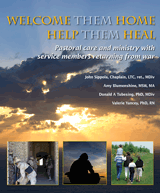Our veterans* are coming home. We are called to help them heal.
The wars in Iraq and Afghanistan are not yet over, but our veterans are coming home.
- Some have completed their military duty.
- More will return to Iraq or Afghanistan for another tour.
- 4,865 have died as of March 2009 and will not return home alive.
- 32,000 have sustained war injuries, and 20,000 are
- returning with Purple Hearts.
- 500,000 carry within them deep, invisible, emotional wounds—unknowable to others, often unknown even to themselves.
- Many have lived through life-altering spiritual trauma and will find the quest for peace and reconciliation more difficult than fighting the war.
- Too many will commit suicide in the coming years—
- probably more than the numbers killed in battle.
- All—yes ALL—returning service members will experience the challenge of re-entry as they leave the war zone behind and begin to put their lives back together.
*In this book we use veterans, service members, and soldiers as generic terms. We refer to specific branches (marines, reservists, etc.) only in relation to specific studies. To reflect the growing prominence of women in the military we have tried to strike a balance on the use of gendered pronouns.
When they come home, excitement is in the air! . . . at first.
Anyone who has seen a typical welcome home event understands the public expressions of joy and relief felt by family members. Young children sit on relatives’ shoulders to catch a first glimpse of their father or mother. Parents breathe a palpable sigh of relief when they see their son or daughter march onto the tarmac, armory, or gym floor. Prayers have been answered, and everyone anticipates that life together can begin once again. Over a few months and with hard work, many veterans and their family members do find a new “normal.”
Behind the jubilant homecoming celebrations, however, many returning veterans hide invisible wounds.
Upon returning home, many veterans face the biggest challenge of their lifetime and begin fighting a personal, hidden war in earnest. Often well concealed at first, for many the signs and symptoms of post-war trauma and stress—depression, anxiety, domestic problems, substance abuse, isolation, suicide, and homelessness— eventually appear. According to the U.S. Defense Department, of the 96,000 National Guard members and reservists who have completed health reassessments since October 2006, half have reported health problems unrelated to combat wounds.
Providing attentive care in the first few months after a veteran returns home is important for several reasons. First, early detection usually results in more effective treatment and better outcomes. Second, early treatment can prevent a cascade of interrelated problems stemming from unaddressed physical, emotional, and spiritual post-war trauma and distress. Loved ones, friends, and close work associates are often the first to notice emerging problems and also become the key people through whom difficulties are initially addressed.
America faces a crisis of care.
Service members and their families face deep spiritual crises not generally in public view. Sufficient resources have not been committed to help returning veterans recover from the traumas of war. To be sure, many good programs are already in place and actively serving returning veterans. Existing governmental programs, however, are stressed to the limit. Adequate numbers of programs, policies, and personnel are not available to meet current needs—and the largest surge of returning veterans has not yet peaked. America, having put forth its best to fight these wars, must now match that effort in helping our sons and daughters heal.
–Welcome Them Home, Help Them Heal, pp. 7-8

Hello! Just want to say thank you for this interesting article! =) Peace, Joy.